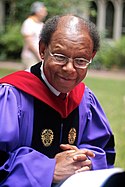James H. Cone Quote
The Christian community, therefore, is that community that freely becomes oppressed, because they know that Jesus himself has defined humanity's liberation in the context of what happens to the little ones. Christians join the cause of the oppressed in the fight for justice not because of some philosophical principle of the Good or because of a religious feeling of sympathy for people in prison. Sympathy does not change the structures of injustice. The authentic identity of Christians with the poor is found in the claim which the Jesus-encounter lays upon their own life-style, a claim that connects the word Christian with the liberation of the poor. Christians fight not for humanity in general but for themselves and out of their love for concrete human beings.
The Christian community, therefore, is that community that freely becomes oppressed, because they know that Jesus himself has defined humanity's liberation in the context of what happens to the little ones. Christians join the cause of the oppressed in the fight for justice not because of some philosophical principle of the Good or because of a religious feeling of sympathy for people in prison. Sympathy does not change the structures of injustice. The authentic identity of Christians with the poor is found in the claim which the Jesus-encounter lays upon their own life-style, a claim that connects the word Christian with the liberation of the poor. Christians fight not for humanity in general but for themselves and out of their love for concrete human beings.
Related Quotes
About James H. Cone
Cone's work was influential from the time of the book's publication and his work remains so today. His work has been both used and critiqued inside and outside the African-American theological community. He was the Charles Augustus Briggs Distinguished Professor of Systematic Theology at Columbia University-affiliated Union Theological Seminary until his death.
